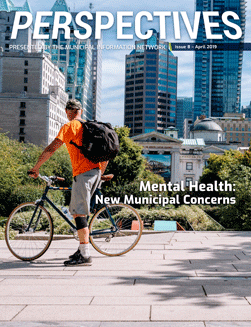When it comes to the mental health of Canadians, it might seem that local governments are out of their jurisdictional waters. This is far from true. The impact is felt every day on the streets and in our communities across Canada.
The statistics are stunning for local government officials. According to the Mental Health Commission of Canada (MHCC):
- By the time Canadians reach the age of 40, half of all people will have had or have a mental illness.
- 53% of Canadians believe depression and anxiety have reached epidemic levels.
- Suicide accounts for 24% of deaths among 15 to 24-year-olds.
- Depression will be the leading cause of disease in Canada by 2020.
In recent years, our understanding of mental health has evolved and this is reflected in the very first mental health strategy for Canadians, Changing Directions, Changing Lives, created by the MHCC.
The MHCC explains that to tackle the crisis we must change the way we think of mental health. We must move away from the view that mental health is only important to those living with mental illness, and that treating mental health issues as they arise is the only way forward.
If you have not struggled with mental health issues, you likely know someone who has. This is a problem which is expected to worsen.
Canada’s towns and cities must understand that mental health and mental illness are not mutually exclusive concepts. The absence of mental illness does not necessarily mean the presence of mental health. While mental illness is largely the domain of qualified health professionals, mental health is a concern for all and becomes the domain of local governments.
Municipalities can significantly affect the crisis or the lives of their citizens by promoting well-being across all areas of life. For example, municipalities can make a difference through their built environment:
Whether we’re talking parks, traffic flow, or housing and neighbourhoods, man-made environment design can have a significant impact on the mental health of communities.
As Cassidy Paxton, researcher at BC Healthy Communities puts it,
“Mental health is a state of well being in which individuals realize their potential, are able to cope with the normal stresses of life, work productively, and contribute to their community. The built environment can promote positive mental health by increasing social connectedness among community members, and by fostering place attachment, which is an emotional bond between a person and place.”
Designing local environments that support the connectedness of community members and demonstrate the inherent value of all people will help promote mental health in your community.
Here are fourteen specific community actions that municipalities can consider:
- Increase community access to green spaces. This might mean the creation of more green spaces throughout your city, the improvement or expansion of existing parks, or increased access for under-served populations.
- Consider novel approaches to increasing green space access. The gardening support service in Hampshire in the UK provides support for seniors through assistive gardening services. This low-cost intervention by the local government supports the well-being of seniors by aiding in the creation and maintenance of community seniors’ own gardens, helping them maintain their independence.
- Consider novel approaches to increasing green space access. The gardening support service in Hampshire in the UK provides support for seniors through assistive gardening services. This low-cost intervention by the local government supports the well-being of seniors by aiding in the creation and maintenance of community seniors’ own gardens, helping them maintain their independence.
- Create more bike lanes/sidewalks, and provide adequate lighting for pedestrian pathways. Creating more bike lanes and safe pedestrian pathways will help support mental health by encouraging physical activity, aiding the flow of traffic, and increasing a community member’s belief that they live in a safe community.
- Design new bus routes. The creation of specific and dedicated bus routes to help make hospital and community-based services easier to access encourages the use of public transit, promotes inclusivity, and demonstrates that those with mental health issues are valued community members.
- Create recreational and social programs for groups at high risk of developing mental health issues. Having a disability can be isolating, and it can be difficult to find suitable activities. People with disabilities are at risk for mental health issues for many reasons, so they could benefit from local government initiatives that address the factors that contribute to mental illness, including isolation and exclusion.
- The city of Brampton is moving in the right direction with their Inclusion and Integration programs, recreation and social programs for persons with disabilities. Their programs help persons with disabilities connect with their community and get some physical exercise. Provincial health authority and city council partnerships can make these happen.
- The city of Brampton is moving in the right direction with their Inclusion and Integration programs, recreation and social programs for persons with disabilities. Their programs help persons with disabilities connect with their community and get some physical exercise. Provincial health authority and city council partnerships can make these happen.
- Training for front-line workers. Recommend local police and fire departments undergo specialized mental health training for all officers. Often those who are specially trained in this area are not first on scene. Recommend education for both departments on the particular difficulties facing vulnerable minorities, including aboriginal, African-Canadian, newly-arrived immigrant, and homeless populations.
- Training for civic employees. Require local government employees to attend mental health literacy training, a course that helps participants understand the basic concepts of mental health. This will help sensitize government employees to the issues faced by those with mental illness, and provide them with an understanding of the basic language of mental health.
- Adopt the Psychological Health and Safety in the Workplace Standard. The MHCC has created a framework for the advancement of mental health in the workplace. By adopting these standards, local governments can promote mental health in their workforce while leading by example.
- Housing First approach to homelessness. Up to 50% of all homeless people in Canada live with serious mental health issues. Approaching the problem of chronic homelessness by providing healthy housing options (affordable, accessible, safe) can reduce homelessness for those living with mental illness, and according to the MHCC, can save three dollars for every two spent.
- Implement stigma-reduction campaigns. Partner with organizations aiming to reduce stigma, like the Mood Disorders Society of Canada and its national campaign “Elephant in the Room.” Municipalities can help change the way our communities view mental illness through easily adoptable measures such as the displaying of an elephant in an office. This visual declares ‘this is a safe space to discuss mental health’.
- Hold a Well-Being Fair. Support local efforts to educate the public on mental health issues and the specific mental health service pathways available in your community.
- ‘Mindfest’ in Toronto is the collaborative effort of several universities and community organizations. It is a full-day of mental health and well-being fair with informative booths, guest speakers, workshops, and even yoga and tai chi.
- ‘Mindfest’ in Toronto is the collaborative effort of several universities and community organizations. It is a full-day of mental health and well-being fair with informative booths, guest speakers, workshops, and even yoga and tai chi.
- Hold a Mental Health Forum. Support the move toward preventing mental illness by holding a forum on mental health in your municipality. Invite health care providers, practitioners, and mental health consumers to attend. Offer awareness presentations, and mental health first-aid workshops, training that helps people learn how to identify mental health issues, provide basic assistance to people in crisis, and find appropriate treatment from qualified professionals.
- Call for early mental health education. Recognize the importance of early mental health education by encouraging your province or territory to implement mental health education through schools and/or partnerships.
- Nova Scotia’s provincial government is adding mental health to the curriculum for a number of grades. This will encourage discussion of mental health, and de-stigmatize mental illness for future generations.
- ‘Partners for Life’ was a program offered by the Mental Illness Foundation in Quebec in the 1990s that raised depression awareness in high schools. Informative sessions taught students about the warning signs of depression, suicidal behaviour, and substance abuse, and what to do if they encountered them. The program raised awareness that depression is a risk factor for suicide, and helped many students get treatment.
- Nova Scotia’s provincial government is adding mental health to the curriculum for a number of grades. This will encourage discussion of mental health, and de-stigmatize mental illness for future generations.
- Appoint an elected member as mental health champion. The mental health champion for your municipality could be responsible for raising mental health awareness and ensuring that all decisions made are in the best interest of the mental health of the community, while also creating links between city councils, health authorities, and self-help agencies.
- Call for more funding. Pressure provincial, territorial and federal governments for more mental health funding and to partner with Self-Help Agencies. Self-Help Agencies (SHAs) are consumer-run, non-profit organizations based in the community that serve people with psychiatric disabilities. SHAs have become a viable option instead of, or in addition to, traditional mental health care. Mental health services can be delivered by SHAs in a cost-efficient manner.
For many years, we’ve been dealing with the mental health crisis by playing catch up—and losing. We now have a chance to deal with this global, societal epidemic differently. The statistics suggest this change cannot come fast enough.
Municipalities can make a difference by moving to a prevention-based approach and by promoting the well-being of all community members.
This article is a call to action for people, communities, and local governments to make some serious changes. We are at a tipping point, and as such, we must call upon all our resources, especially local governments, to actively implement solutions.
Resources:
Journal Articles:
Davidson, L., Chinman, M., Sells, D. and Rowe, M. (2005). Peer Support Among Adults with Serious Mental Illness: A Report from the Field. Schizophrenia Bulletin, 32(3), pp.443-450.
Hardiman, E. and Segal, S. (2003). Community membership and social networks in mental health self-help agencies. Psychiatric Rehabilitation Journal, 27(1), pp.25-33.
Hodges, J., Hardiman, E. and Segal, S. (2003). Predictors of Hope Among Members of Mental Health Self-Help Agencies. Social Work in Mental Health, 2(1), pp.11-13.
Link, B., Struening, E., Neese-Todd, S., Asmussen, S. and Phelan, J. (2001). Stigma as a Barrier to Recovery: The Consequences of Stigma for the Self-Esteem of People with Mental Illnesses. Psychiatric Services, 52(12), pp.1621-1626.
Segal, S., Silverman, C. and Temkin, T. (1995). Measuring empowerment in client-run self-help agencies. Community Mental Health Journal, 31(3), pp.215-227.
E-books/PDFs:
Aked, J., Michaelson, J. and Steuer, N. (2010). The Role of Local Government in Promoting Wellbeing. [ebook] London: Local Government Improvement and Development, pp.6-68. Available at: https://b.3cdn.net/nefoundation/bb8366694aa033e578_vvm6bfv3t.pdf [Accessed Feb. 2019].
Changing Directions, Changing Lives: The Mental Health Strategy for Canada (2012). [ebook] Calgary, AB.: Mental Health Commission of Canada. Available at: https://www.mentalhealthcommission.ca/sites/default/files/MHStrategy_Strategy_ENG.pdf. [Accessed Feb. 2019].
How Municipalities Can Help Improve Mental Health Outcomes. (n.d.). [ebook] Mental Health Commission of Canada, p.1. Available at: https://mentalhealthcommission.ca/sites/default/files/MHCC_Municipalities_Improve_MH_Outcomes_Facts_FINAL_Bilingual_1.pdf.
Improving Mental Wellbeing Local Government Action Guide. (2016). [ebook] Victoria, Australia: Victorian Health Promotion Foundation, pp.1-3. Available at: https://www.vichealth.vic.gov.au/-/media/VHIndicators/MWB---LGA-Action-Guide.pdf?la=en&hash=759DB82B349D39D7367DEDAF120DE0E6CB85D476 [Accessed Feb. 2019].
Inclusive. (2019). [ebook] Brampton, Ont.: City of Brampton, pp.1-2. Available at: https:" //www.brampton.ca/EN/residents/Recreation/Guides/Pages/Recreation-Guide.aspx [Accessed Feb. 2019].
Mental Health Commission Municipal Recommendations. (n.d.). [ebook] The Mental Health Commission of Canada, pp.1-2. Available at: https://www.mentalhealthcommission.ca/ [Accessed Jan. 2019].
No Health Without Mental Health: A Guide for Local Authorities. (2013). [ebook] N/A: Mental Health Strategic Partnership, pp.1-3. Available at: https://www.mind.org.uk/media/343118/No_Health_Without_Mental_Health_Local_Authorities.pdf [Accessed Jan. 2019].
Websites:
Alberta.cmha.ca. (2018). Over half of Canadians consider anxiety and depression ‘epidemic’ | CMHA Alberta Division. [online] Available at: https://alberta.cmha.ca/news/over-half-of-canadians-consider-anxiety-and-depression-epidemic/
EENet - Evidence Exchange Network. (2016). Mindfest: A festival and mental health fair celebrating all minds. [online] Available at: https://eenet.ca/article/mindfest-festival-and-mental-health-fair-celebrating-all-minds [Accessed Feb. 2019].
Mentalhealthcommission.ca. (n.d.). Mental Health Strategy for Canada | Mental Health Commission of Canada. [online] Available at: https://www.mentalhealthcommission.ca/English/resources/mhcc-reports/mental-health-strategy-canada [Accessed Feb. 2019].
Mood Disorders Society of Canada. (n.d.). Elephant in the Room Campaign. [online] Available at: https://mdsc.ca/stigma/elephant-in-the-room-campaign/ [Accessed Feb. 2019].
Paxton, C. (n.d.). Four ways local governments can support mental health through community design | PlanH. [online] Planh.ca. Available at: https://planh.ca/news/four-ways-local-governments-can-support-mental-health-through-community-design [Accessed Feb. 2019].
Wellesleyinstitute.com. (n.d.). Mental Health and Cities Summit. [online] Available at: https://www.wellesleyinstitute.com/topics/healthy-communities/mental-health-and-cities-summit/ [Accessed Feb. 2019].
World Health Organization. (2018). Depression. [online] Available at: https://www.who.int/en/news-room/fact-sheets/detail/depression [Accessed Jan. 2019].








